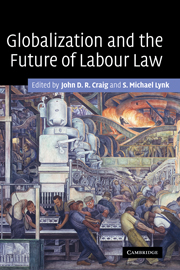Book contents
- Frontmatter
- Contents
- Notes on contributors
- Acknowledgements
- Table of cases
- List of abbreviations
- Introduction
- PART I Perspectives on globalization
- PART II International labour standards
- PART III The European Union
- PART IV The Americas
- PART V The ILO
- 12 International labour standards in the globalized economy: obstacles and opportunities for achieving progress
- 13 The growing importance of the International Labour Organization: the view from the United States
- PART VI Labour rights
- Bibliography
- Index
13 - The growing importance of the International Labour Organization: the view from the United States
Published online by Cambridge University Press: 23 July 2009
- Frontmatter
- Contents
- Notes on contributors
- Acknowledgements
- Table of cases
- List of abbreviations
- Introduction
- PART I Perspectives on globalization
- PART II International labour standards
- PART III The European Union
- PART IV The Americas
- PART V The ILO
- 12 International labour standards in the globalized economy: obstacles and opportunities for achieving progress
- 13 The growing importance of the International Labour Organization: the view from the United States
- PART VI Labour rights
- Bibliography
- Index
Summary
Introduction
For most people in the United States, the International Labour Organization (ILO) is virtually an unknown multilateral organization. However, in our globalized world, it is becoming increasingly important. Much of this increased importance is being driven by US trade and investment policies whose seeds go back to the 1950s. This itself is ironic. Although American policy since the failed Bricker Amendment in the 1950s has been that domestic laws should not be made by the consequences of ratified treaties, the United States is nevertheless using the ILO and its conventions as a tool to raise basic worker rights in other countries. At the same time, a law that was passed in 1789 to address the consequences of the acts of pirates could possibly result in ILO standards de facto amending domestic labour and employment law in the United States.
Although joining the ILO in 1934, the United States did not seriously adhere to the ILO constitutional obligation to ratify ILO conventions until 1980. As a consequence, the United States had ratified just seven conventions prior to 1980, the last in 1953. Six were maritime conventions, and the seventh endorsed the transfer of the ILO from the League of Nations to the United Nations. Since 1980, the United States has ratified another seven conventions, two of which are fundamental ILO conventions concerning forced labour and the worst forms of child labour. Another fundamental convention concerning equal treatment has been before the Senate Foreign Relations Committee since 1998.
- Type
- Chapter
- Information
- Globalization and the Future of Labour Law , pp. 356 - 374Publisher: Cambridge University PressPrint publication year: 2006
- 1
- Cited by



